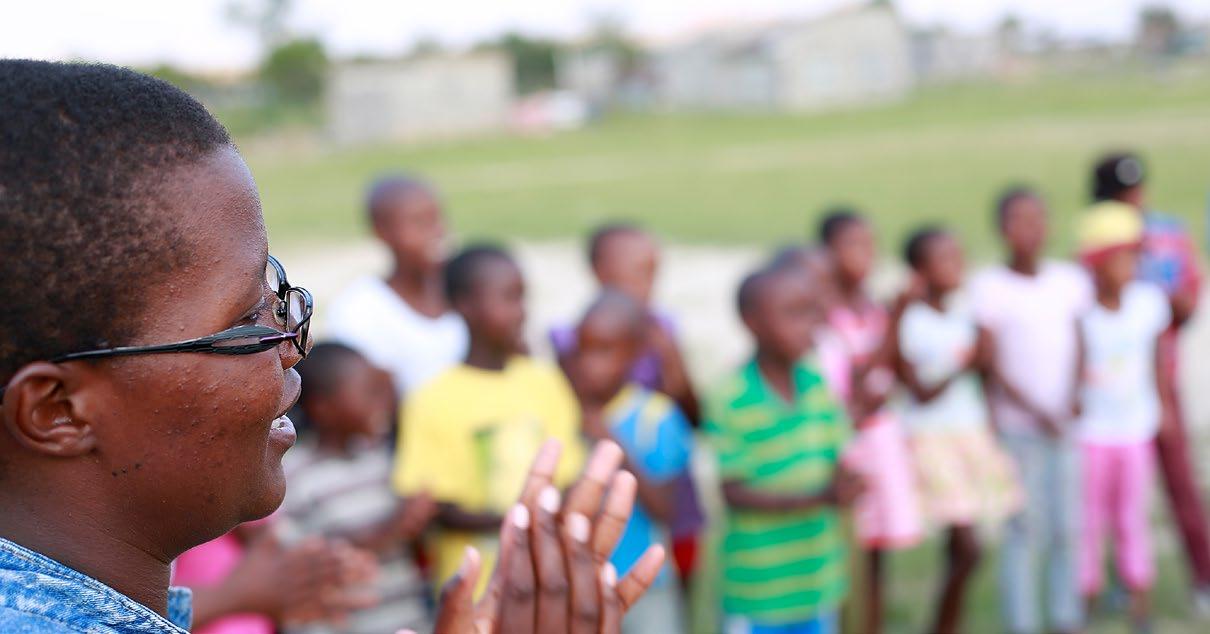
4 minute read
Our Strategy and Work
by Sentebale
SUCCESS STORY
MAMOHATO IS INITIATED ON PREP
Advertisement
Mamohato, a 22-year-old woman from Leribe District, Lesotho shares that her life has changed for the better since she started taking part in Sentebale’s peer educator sessions. For a long time, she was afraid to raise the issue of condom use with her husband who has multiple sexual partners. However, at the sessions she learnt about her sexual health as well as reproductive rights and PrEP (pre-exposure prophylaxis) and its benefits. Through the skills learnt, she has been able to address her concerns with her husband assertively and with the support of her peer educator, she has been initiated on PrEP via her local health facility.

HIGHLIGHTS FOR THE YEAR
FINANCIAL HEADLINES
2021 secured income: £3.13m (2020: £2.39m) 2021 charitable activities expenditure: £2.53m (2020: £2.50m)
PROGRAMME HIGHLIGHTS
Our Let Youth Lead advocates informed over 9,500 young people aged between 10 to 24 years old of services they are entitled to access at health facilities.

STRATEGIC OBJECTIVE 1: HEALTH & WELLBEING
We strengthen the social and emotional wellbeing of the most vulnerable children and young people living with, or at risk of, HIV by addressing their basic mental health with psychosocial support, information sharing, and providing access to youth-friendly health services.
OUR OUTCOMES
During the reporting period Sentebale worked within the constraints of Covid-19 restrictions to achieve the following outcomes: • More children and young people know their HIV status • Children and young people have improved understanding of sexual and reproductive health and rights • More children and young people benefitted from improved uptake of health services, treatment and retention in treatment and care • Children and young people’s lives improved through psychosocial support
ACHIEVEMENTS IN LESOTHO & BOTSWANA
In Lesotho, our peer educators worked with health professionals across multiple districts to test children and young people for HIV, including referring nearly 3,500 children and young people who tested HIV positive to health clinics to initiate treatment. Additionally, they tracked over 1,300 children and young people living with HIV identified as defaulting from their medication; over 85% returned to treatment and care.
In the absence of face-to-face clubs and camps for children and young people living with HIV, they received quarterly calls and multi-month collection and dispensing of medication was instated with health facilities, including a snack and transport reimbursement to and from health clinics.
Additionally, peer educators delivered sexual and reproductive health and rights education, and life skills information to nearly 27,000 children and young people, and distributed 83,000 condoms. In Botswana, under PEPFAR’s flagship DREAMS programme, 370 girls aged 15 to 24 years old were referred for HIV testing; 82% of whom now know their HIV status. Those who tested positive were supported with treatment and retention in health care services through the provision of psychosocial support. Those who tested negative were put through the DREAMS layering programme aimed at empowering them with life skills to keep them HIV negative. Throughout the reporting period, eight of our Let Youth Lead advocates received training on sexual and reproductive health and rights, and facilitated conversations with their peers on the topic. Let Youth Lead advocates developed a Covid-19 advert encouraging young people living with HIV on how to stay safe during the pandemic.
LEARNING TO LIVE WITH HIV
Limpho is a bright 15-year-old secondary school student from a village in the northern district of Butha-Buthe, Lesotho. She lives with her mother and younger brother, and like many young people in Lesotho was born with HIV.
As Limpho approached her teenage years, her mother tried to inform her of her HIV status. However, Limpho found it difficult to accept and for a period was unable to be enrolled on medication putting herself and others at risk. In early 2020, Limpho took part in her first youth-led session hosted by a Sentebale peer educator where a range of topics affecting young people were discussed. Limpho told us that she felt comfortable to open up to the peer educator and talk about her HIV status. She said, “The environment and personality of the peer educator made it easier for me to approach him and open up about my status.” Subsequently, Limpho was linked with Sentebale’s Network Club at St Peter’s Health Centre where she continues to receive support from professionals and her peers who share similar experiences. Limpho’s adherence to medication has improved and she says she is now in the position to help other young people who are struggling to accept their HIV status and as such considers herself as a change agent. The environment and personality of the peer educator made it easier for me to approach him and open up about my status.”
LIMPHO
STUDENT, AGED 15





